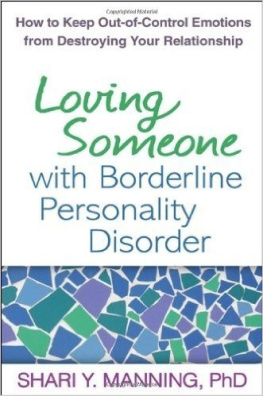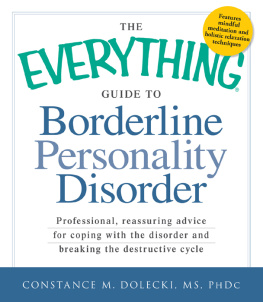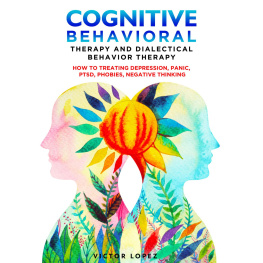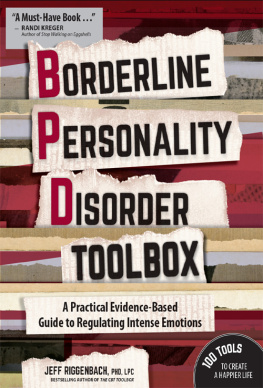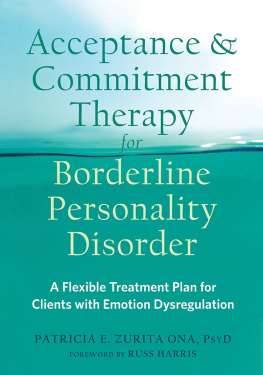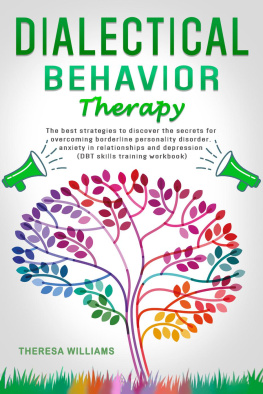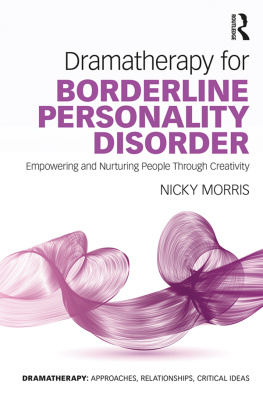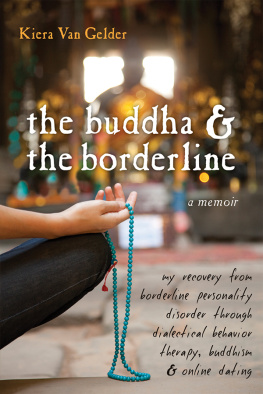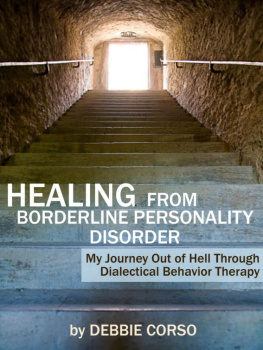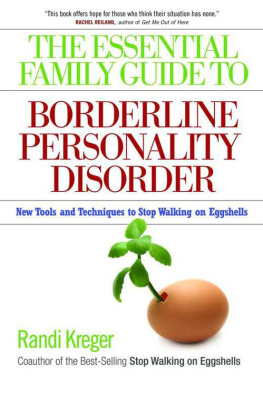Praise for
Loving Someone
with Borderline Personality Disorder
This hopeful yet realistic book is an indispensable tool for managing relationships with persons who have borderline personality disorder. Research based, clearly written, and practical, this guide to a complex disorder is highly recommended.
Library Journal
More than many other disorders, BPD affects relationships. This book offers families and friends invaluable skills for helping both their loved one and themselves. Dr. Manning has done a beautiful job. A must read.
Perry D. Hoffman, PhD, President, National Education Alliance
for Borderline Personality Disorder
This book opened my eyes to BPD! I wanted to understand what my friend was going through and help as much as possible. I was amazed to find that the techniques in the book really did help me respond differently during one of her episodes, when I normally would have just gotten angry. Our communication (and my feelings toward her) have truly benefited.
R. P., South Carolina
Dr. Mannings compassion, understanding, and nonjudgmental approach resonate on every page of this readable, helpful book. She eloquently describes the challenges of caring for someone with BPD and provides numerous step-by-step strategies for dealing with common problems.
Michaela Swales, PhD, School of Psychology, Bangor
University, United Kingdom
The title says it all! Dr. Manning explains what she has learned about the true nature of BPD from the experts themselvesthose who have the disorder. She shows family and friends how our instinctive responses to the crises associated with BPD are frequently ineffective or even harmful, and illuminates what we can do differently, providing practical, incisive, step-by-step guidance. The book helps readers understand their complicated relationship with a person with severe emotion dysregulation. It provides valuable tools for dealing with self-harm, suicidality, and hospitalization decisions. Of crucial importance, Dr. Manning clearly affirms that BPDand the pain experienced by those who sufferis real. We highly recommend this book.
Jim and Diane Hall, parents of an adult child with BPD and Family Educators for the National Alliance on Mental Illness and the National Education Alliance for Borderline Personality Disorder
Try out the recommendations this book gives you. You will be surprised by how much better your relationships become.
from the Foreword by Marsha M. Linehan, PhD, Director,
Behavioral Research and Training Clinics, University of Washington
Epub Edition ISBN: 9781606234860
2011 The Guilford Press
A Division of Guilford Publications, Inc.
72 Spring Street, New York, NY 10012
www.guilford.com
All rights reserved
The information in this volume is not intended as a substitute for consultation with healthcare professionals. Each individuals health concerns should be evaluated by a qualified professional.
No part of this book may be reproduced, translated, stored in a retrieval system, or transmitted, in any form or by any means, electronic, mechanical, photocopying, microfilming, recording, or otherwise, without written permission from the publisher.
Last digit is print number: 9 8 7 6 5 4 3
Library of Congress Cataloging-in-Publication Data
Manning, Shari Y.
Loving someone with borderline personality disorder : how to keep out-of-control emotions from destroying your relationship / by Shari Y. Manning.
p. cm.
Includes bibliographical references and index.
ISBN 978-1-59385-607-6 (pbk. : alk. paper) ISBN 978-1-60918-195-6 (hardcover : alk. paper)
1. Borderline personality disorder. 2. Interpersonal relations.I. Title.
RC569.5.B67M356 2011
158.2087'4dc22
2011007931
For Elizabeth Younis Bush (Mama),
who has always been exactly the
mother I needed
Contents
|
|
|
|
|
|
|
|
P ART I
Understanding Your Loved One
and Your Relationship
|
|
|
|
|
|
|
|
|
P ART II
The Many Faces of Borderline
Personality Disorder
|
|
|
|
|
|
|
|
|
|
|
|
P ART III
Dealing with Crisis and Getting Help
|
|
|
|
|
|
|
|
|
|
|
|
|
Foreword
Borderline personality disorder (BPD) is one of the most stigmatized mental disorders. Popular books about BPD may make readers cringe and want to run away from anyone who meets the criteria for the disorder. Mental health professionals frequently refuse to accept into treatment people diagnosed with BPD. Even in routine medical settings, the diagnosis can be the kiss of death for receiving tender loving care.
I cannot count the number of phone calls we get at my research clinic from mothers and fathers, daughters and sons, brothers and sisters, husbands and wives, current and past lovers, and even coworkers of individuals who meet the criteria for BPD. The questions are usually twofold: (1) How can we survive this person? and (2) How can we help this person we love? A third set of questions sometimes arises: Am I a bad person? Why cant I make him [or her] happy? The basic message is HELP ME! Often these initial phone calls lead to in-person consultations. Sometimes multiple sessions are needed to provide any help at all.
At my clinic at the University of Washington, we offer a skills training group specifically for the family and friends of individuals who meet the criteria for BPD. The skills are the same ones taught to the individuals with BPD in our dialectical behavior therapy (DBT) treatment program. DBT skills (mindfulness, emotion regulation, crisis survival, reality acceptance, and interpersonal effectiveness) have been shown to reduce emotion dysregulation, anger, and impulsive behavior. But such a skills program can only reach so many people. Attending it requires that those who want to help someone come into treatment themselvesa difficult thing to ask for or to do.
What if, instead of having to go to therapy to get help, you could find a good book that would tell you how to do it? This is such a book. It is written by an expert in treating BPD, an expert in DBT, and a person who has spent much of her life teaching others how to effectively treat and, yes, to love individuals with BPD. Shari Manning has worked with relatives for whom the central questions were Should I leave or stay? or Should I send the person somewhere out of the house and away from me for therapy? She knows what she is talking about.
Dr. Mannings first step is helping you understand the person with BPD. This understanding is, of course, central if you are to find your way back to loving the person with whom you are so often furious. She then introduces the DBT validation skills that are a central part of the strategies taught to therapists as well as a critical set of skills taught to clients and family members.
Next page
